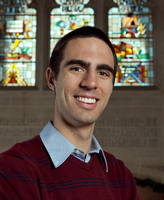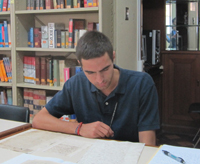

It is widely known that Spanish missionaries played a significant role in introducing Catholicism to the peoples of the Andes throughout the colonial period. Notre Dame senior history major Joseph VanderZee traveled to archives in Lima and Rome to dig a little deeper and find out what these early missionaries thought of the indigenous population—and how their attitudes affected the development of the Peruvian Church.
During his research, he discovered an understudied surviving section of Jesuit Diego Francisco Altamirano’s sweeping Historia de la Provincia del Perú, the original manuscript of which was destroyed in a 20th century library fire. It became the centerpiece of VanderZee’s senior thesis.
“Altamirano’s anecdotes of miracles, demons, and biblical allusions give his history its own distinct coloring, while revealing ideologies that underlined his Church’s and society’s work,” says VanderZee, who was invited to present his findings at the Final Colloquium of the Glynn Family Honors Program in late April, as well as the University’s Undergraduate Scholars Conference in May.
Inside International Archives
A rigorous course of study blending the humanities and sciences, the Glynn program makes special seminars, field trips, and mentoring opportunities available to some of the most promising scholars of each incoming class at Notre Dame. Every Glynn scholar is then challenged to complete a senior thesis, and the program guarantees students at least one summer’s worth of funding to conduct original research.
VanderZee’s trip to Peru last summer was supported by the Undergraduate Research Opportunity Program in the College of Arts and Letters’ Institute for Scholarship in the Liberal Arts and a grant from the University’s Kellogg Institute for International Studies, where he was a part of the International Scholars Program. Funding from the University’s Nanovic Institute for European Studies allowed him to continue his senior thesis research in Rome this January.
“These fellowships gave me the chance to become intimately familiar with various historical archives in Lima and Rome,” VanderZee says, “which is in itself a huge advantage because archival work is critical to historical scholarship and graduate study.”
Access to Primary Sources

The primary documents VanderZee was able to access abroad were a vital part of his research, he says.
“The sources I found in both Lima and Rome helped me understand the period in a much deeper way than I would by reading secondary literature alone,” he says. “Seeing the individual stories of my human subjects in their own handwriting brought them to life.”
Under the guidance of Rev. Theodore Hesburgh Professor of Arts and Letters Sabine MacCormack, VanderZee pored over every relevant document he could find—from accounting books to personal letters.
“Constitutions for schools and seminaries, records of regulatory visits to missionary parishes, Jesuit administrative paperwork, and Altamirano’s detail-rich history have all served me as windows into the daily work of religious instruction and training for both Creole and indigenous Peruvians,” he says.
“At first, their mundane details seemed hardly meaningful. However, they helped me understand what their authors considered critical for bringing either their seminarians or native subjects into a new way of life. Their meticulous organization and regulation of physical space, objects, and time were ways to conquer the messy spiritual world they had encountered—and would shape anew.”
In Pursuit of Global Skills
More than simply a chance to conduct in-depth research on a topic he found intriguing, VanderZee says his senior thesis experience helped him develop valuable research skills in a global context.
“Now I feel comfortable entering new archives in foreign-language situations, reviewing catalogs, and developing strategies—sometimes on-the-fly—to find the documents most relevant to my research questions.”
And those skills, he says, will continue to be an asset long after graduation.
“It has given me a huge advantage when it comes to applying to, and thriving in, a PhD program in Latin American history, which I hope to do in the future.”
First, VanderZee says, he plans to spend two years teaching high school social studies in Texas as part of the Alliance for Catholic Education’s Service Through Teaching program.
Learn More >
- Department of History
- Glynn Family Honors Program
- Arts and Letters senior thesis page
- Video: Arts and Letters senior theses for 2012
- Institute for Scholarship in the Liberal Arts
- Kellogg Institute Undergraduate Summer Research Grants
- Kellogg Institute International Scholars Program
- Nanovic Institute for European Studies
- ACE Service Through Teaching
Originally published by at al.nd.edu on May 14, 2012.